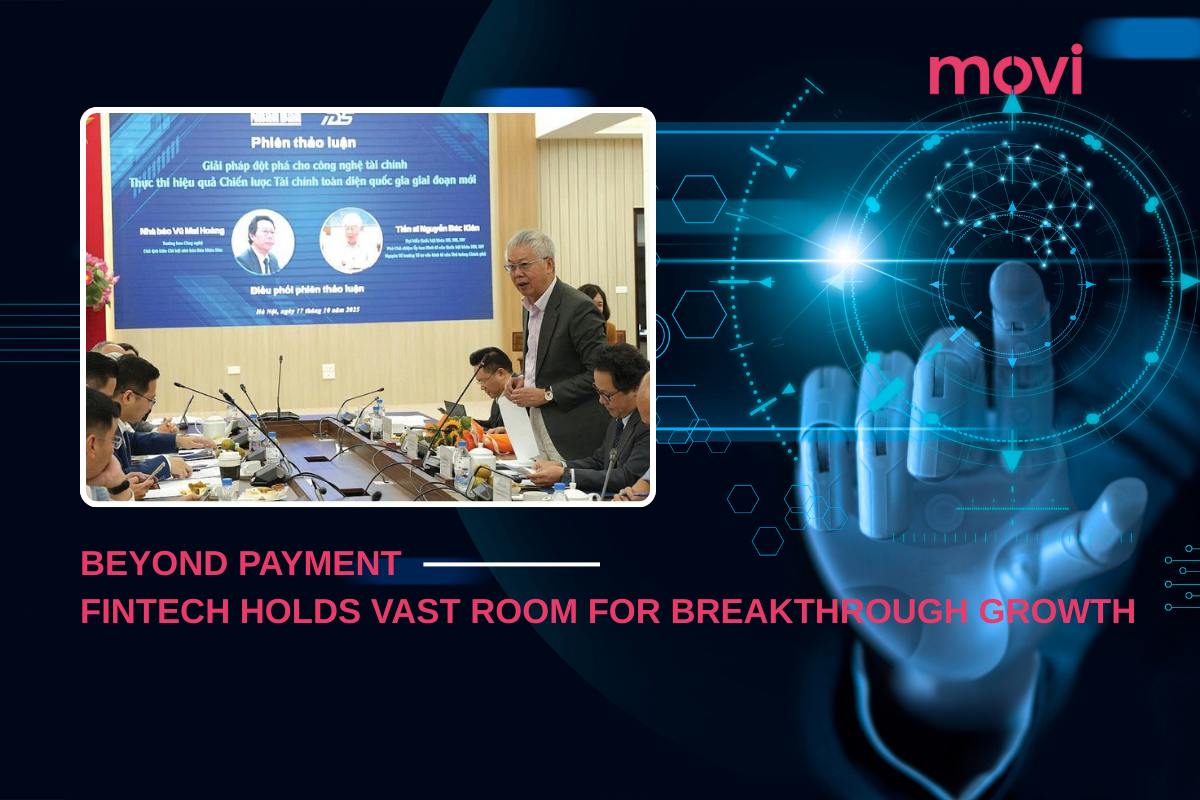
Loading
BEYOND PAYMENT, FINTECH HOLDS VAST ROOM FOR BREAKTHROUGH GROWTH
(TBTCO) – Fintech is creating strong momentum for cashless payment and digital financial services.
According to research by the Institute for Digital Economic Strategy Development (IDS), behind the payment sector, fintech still has much potential for breakthroughs such as developing banking agent models and digital banks.... Fintech “Unlocks” Access to Capital
Speaking at the seminar “Implementing the National Financial Inclusion Strategy: Opportunities for Household Businesses to Access Financial Technology and Promote Growth”, jointly organized by Nhân Dân Newspaper and the Institute for Digital Economic Strategy Development (IDS),
Mr. Nguyễn Thanh Hiển, General Director of Finviet Technology Corporation, shared the story of a shop in Central Vietnam.
Previously, the shop owner only recorded daily business activities in a notebook and borrowed money from acquaintances at an interest rate of 3% per month.
After six months using the comprehensive digital solution POS ECO – integrated with e-invoicing and digital signature features – revenue became transparent and transaction data was connected to the bank.
The shop owner was then granted a VND 200 million credit limit by SHB Bank, with an interest rate only one-third compared to personal loans.
At the same time, thanks to the integration of ECO Pay, 70% of transactions shifted to electronic payments, reducing the risks of cash handling. From this stable data source, the business owner was also able to join micro-saving and low-cost health insurance packages.

Dr. Nguyễn Đức Kiên, former Head of the Prime Minister’s Economic Advisory Group, coordinated the discussion session at the seminar. (File photo)
The Electric Power Finance Joint Stock Company (EVF) is one of the enterprises continuously expanding financial products through digital platforms. Mr. Nguyễn Tiến Sỹ, Director of the Digital Finance Division and Head of EVF Hanoi Branch, said the company has proactively applied many advanced technologies such as eKYC (electronic customer identification), mobile app, online lending, and open data processing to serve individuals and household businesses – groups that often face difficulties accessing traditional bank credit.
In addition, EVF cooperates with digital technology partners to help corporate clients not only access loans but also digitize sales management and business operations. EVF has recorded positive business results, with total outstanding loans reaching nearly VND 53 trillion and a non-performing loan ratio of only 0.7%, much lower than the industry average.
Recently, EVF has also expanded lending into new sectors such as commerce, energy, and real estate.
It can be seen that enterprises operating in the financial technology (fintech) sector are playing an important role in implementing the National Financial Inclusion Strategy.
With advantages in technology, data, operating costs, and business models, fintech helps enterprises, household businesses, and citizens easily access digital financial services.
In particular, in the eyes of foreign investors, Vietnam’s fintech market is considered highly potential.
Equal and Innovative Policies Create Motivation
“In the next stage, it is necessary to maintain a fair and innovative policy environment. From there, the market will respond and create spillover effects, generating the next momentum and concrete models. The research group expects that in the future, access to financial services for vulnerable groups will improve positively compared to the results we have collected in the past period.” - ThS. Đoàn Ngọc Khanh, Institute for Digital Economic Strategy Development (IDS)
Emphasizing the role of fintech in providing digital financial services,
Ms. Đoàn Ngọc Khanh, expert from IDS, said fintech enterprises are contributing to restructuring the financial ecosystem by separating services in the traditional model into smaller segments and developing them in a more specialized and in-depth direction.
“After separation, fintech attracts enterprises from other economic sectors to participate in the financial services market, such as retail, transportation, public or semi-public service enterprises,” Ms. Khanh stated.
In addition, fintech also brings along the customer base of these sectors, together expanding the shared customer database from the traditional model to the new one.
Customer data becomes a shared resource for all market participants.
Great Potential for Fintech as Policy Opens the Way
Vietnam introduced a sandbox mechanism for fintech as early as 2008, mainly in payment intermediaries and infrastructure testing.
However, it took 17 years until 2025 to issue the next framework — notably Decree No. 94/2025/NĐ-CP dated April 29, 2025, which stipulates the controlled testing mechanism in the banking sector.
In reality, the process of developing and applying financial technology still faces many obstacles due to limited policy coordination, and lack of openness and connection between regulatory agencies, technology enterprises, and traditional financial–credit institutions.
Regarding growth potential, Ms. Đoàn Ngọc Khanh pointed out that there are still many directions for expansion.
One notable model is agent banking, where banks — either owning or co-operating with fintech firms and other partners - provide banking-like financial services.
The key difference of this model is its focus on serving vulnerable customer groups, those who often do not qualify for traditional banking services.
“A more advanced and modern model is the digital bank. Currently, three countries stand out in providing this model: China, Singapore, and South Korea. The digital banking model is entering a strong growth phase and can compete globally,” Ms. Khanh emphasized.
For Vietnam, according to IDS researchers, fintech is currently positioned mainly within the agent banking model.
However, its ability to independently define business directions remains limited, as policy changes occur slowly.
According to the experience of many countries, they conduct multiple rounds of testing: if the pilot proves effective, it is officially adopted; if not, it is eliminated and replaced by new policies.
“Such continuous experimentation allows countries to develop the agent banking or digital banking models currently seen in the global market,” IDS representative concluded.
Source: thoibaotaichinhvietnam.vn














